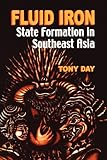Fluid Iron : State Formation in Southeast Asia / Tony Day.
Material type: TextPublisher: Honolulu : University of Hawaii Press, [2002]Copyright date: ©2002Description: 1 online resource (352 p.)Content type:
TextPublisher: Honolulu : University of Hawaii Press, [2002]Copyright date: ©2002Description: 1 online resource (352 p.)Content type: - 9780824826178
- 9780824862541
- JQ750.A58 D393 2002
- online - DeGruyter
- Issued also in print.
| Item type | Current library | Call number | URL | Status | Notes | Barcode | |
|---|---|---|---|---|---|---|---|
 eBook
eBook
|
Biblioteca "Angelicum" Pont. Univ. S.Tommaso d'Aquino Nuvola online | online - DeGruyter (Browse shelf(Opens below)) | Online access | Not for loan (Accesso limitato) | Accesso per gli utenti autorizzati / Access for authorized users | (dgr)9780824862541 |
Browsing Biblioteca "Angelicum" Pont. Univ. S.Tommaso d'Aquino shelves, Shelving location: Nuvola online Close shelf browser (Hides shelf browser)

|

|

|

|

|

|

|
||
| online - DeGruyter Fictions of Desire : Narrative Form in the Novels of Nagai Kafu / | online - DeGruyter Fields of the Lord : Animism, Christian Minorities, and State Development in Indonesia / | online - DeGruyter The Filipino Piecemeal Sugar Strike of 1924–1925 / | online - DeGruyter Fluid Iron : State Formation in Southeast Asia / | online - DeGruyter Focusing the Familiar : A Translation and Philosophical Interpretation of the Zhongyong / | online - DeGruyter Forest Recollections : Wandering Monks in Twentieth-Century Thailand / | online - DeGruyter Foundations of Confucian Thought : Intellectual Life in the Chunqiu Period, 722-453 B.C.E. / |
Frontmatter -- Contents -- Preface -- 1. Studying the State in Southeast Asia: Definitions, Problems, Approaches -- 2. Ties That (Un)Bind -- 3. Cosmologies, Truth Regimes, and Invulnerability -- 4. Bureaucracy, Reason, and Ritual -- 5. Violence and Beauty -- Conclusion: Alternative States, Incongruous Region -- References -- Index -- About the Author
restricted access online access with authorization star
http://purl.org/coar/access_right/c_16ec
Fluid Iron is the first extended treatment of state formation in Southeast Asia from early to contemporary times and the first book-length analysis of Western historical and ethnographic writing on the region. It includes critical assessments of the work of Clifford Geertz, O.W. Wolters, Benedict Anderson, and other major scholars who have written on early, colonial, and modern Southeast Asian history and culture. Making use of the ideas of Weber, Marx, Foucault, and postmodern and postcolonial theory, Tony Day argues that culture must be restored to the study of Southeast Asian history so that the state and historical developments in the region can be returned to their own "alternative" historical contexts and trajectories. He employs a wide range of contemporary scholarship, as well as Southeast Asian literary and historical texts, inscriptions, and temples to explore the kinds of concepts and practices--kinship networks, cosmologies, gender identities, bureaucracies, rituals, violence and aesthetics--that have been used for centuries to build states.Highly readable and accessibly written, Fluid Iron demonstrates that Southeast Asian state building has taken place in a part of the world that has always been a crossroads of cultural and transcultural change. Day urges Southeast Asians to learn more about the history of their own state formations so they can safeguard not only human freedom, but also the "incongruity" of their unique region in the years ahead.
Issued also in print.
Mode of access: Internet via World Wide Web.
In English.
Description based on online resource; title from PDF title page (publisher's Web site, viewed 02. Mrz 2022)


